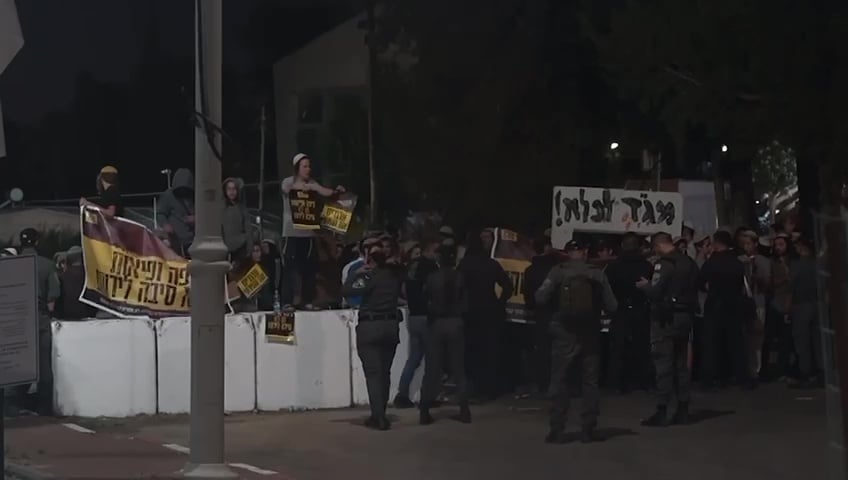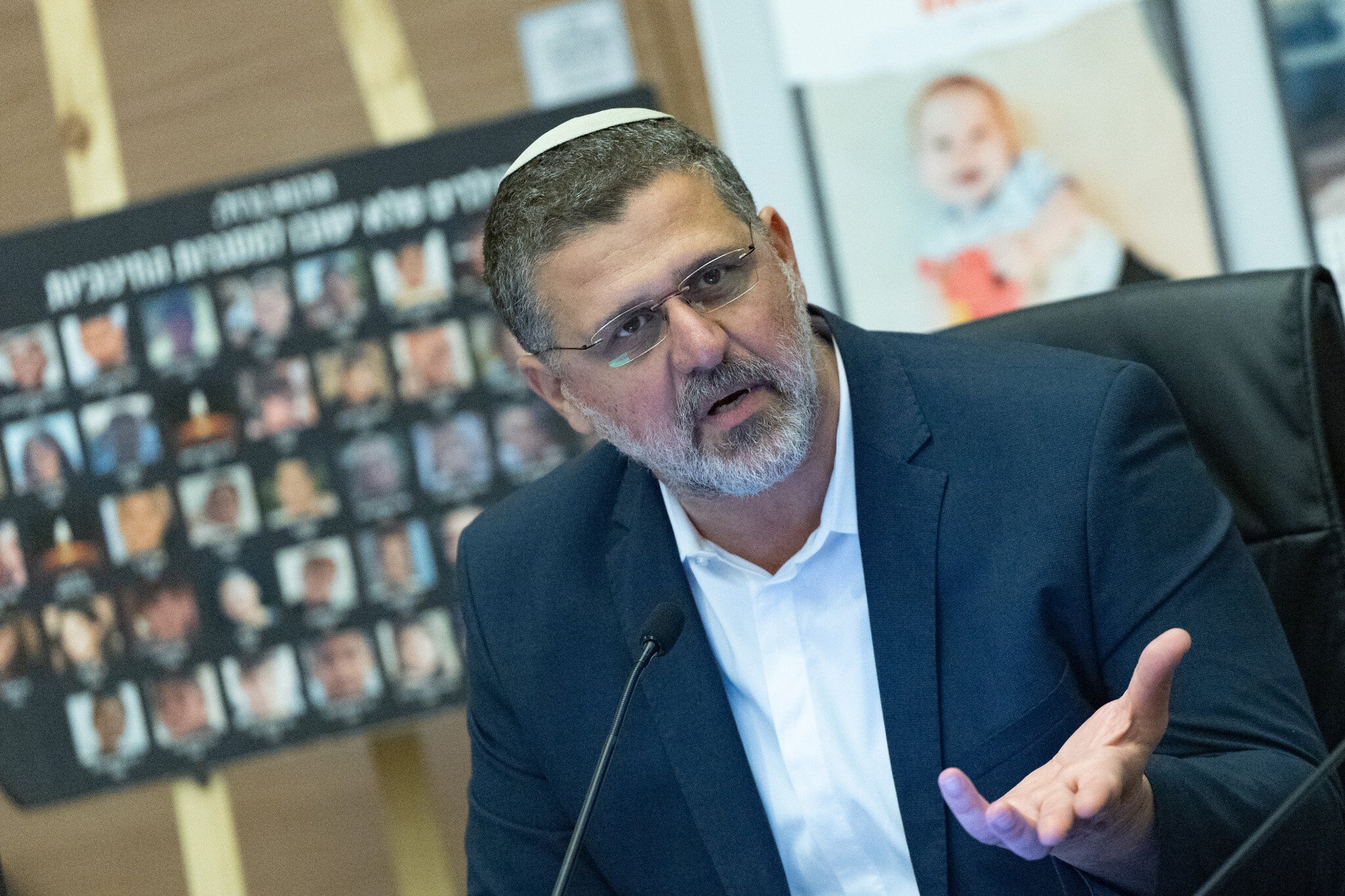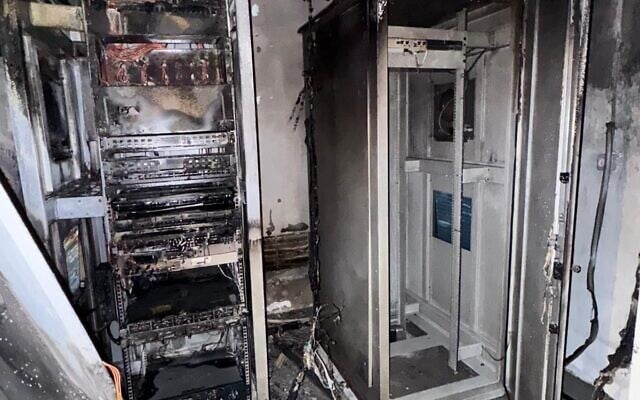Dozens of Jewish extremists set fire to a security installation and rioted outside a West Bank base overnight Sunday-Monday, days after an officer in the Israel Defense Forces was assaulted by settlers.
Members of the crowd held up a sign declaring “the battalion commander is a traitor,” referring to the officer.
A military official said some of the settlers tried to break into the Binyamin Regional Brigade military base in the central West Bank, threw rocks and sprayed mace at troops, and slashed the tires of army vehicles.
Border Police officers used stun grenades to disperse the rioters.
Additionally, Israeli settlers torched a multi-million-shekel security installation used to “thwart terror attacks and maintain security” in the Ramallah area of the West Bank overnight, according to the IDF.
The military said damage to the site “poses a danger to the security of the residents.”

Settlers outside the Binyamin Regional Brigade military base in the West Bank, June 29, 2025 (Screenshot/IDF)
“The IDF condemns any act of violence against security forces and expects security forces to bring to justice Israeli civilians who harm security personnel who are carrying out their duty to protect Israeli citizens,” the military said in a statement.
It added that it “will continue to focus on protecting civilians, while also enforcing the law and preventing any illegal activity, wherever it may occur.”
There were no reports of arrests in either incident. The Shin Bet has opened an investigation into the security installation arson.
The activists who rioted outside the base were protesting the use of warning shots against settlers who ambushed a military patrol on Friday night, which apparently resulted in the injury of a teenager.
They demanded that the military prosecute the commander of the Binyamin Brigade’s 7114th Battalion, who had been attacked along with troops by Jewish extremists earlier in the evening and was not in the vicinity of the shooting.
Footage shows a riot by Israeli settlers outside the Binyamin Regional Brigade base in the West Bank, late June 29, 2025. During the riot, settlers slashed the tires of army vehicles and tried to break into the base. (Israel Defense Forces)
The Friday night shooting incident occurred after reservists and police were dispatched to an area near the Palestinian village of Kafr Malik due to the arrival of several suspects there.
The area had been declared a closed military zone due to a settler attack there on Wednesday, in which three Palestinians were killed by IDF fire, and repeated attempts by settlers to establish an illegal outpost near the village on private Palestinian land.
When the troops arrived at the scene, including the battalion commander, they were attacked by the settlers, who had called for backup.
Some 70 settlers reached the area, where they beat, choked, and hurled rocks at the troops and slashed the tires of a police cruiser, according to the IDF.
The forces responded with riot dispersal means, including a sponge grenade. However, no live fire was used by the forces there. Six suspects were detained.
The second incident that evening — an attack on a military patrol — took place approximately two hours later at 12:37 a.m., some six kilometers (3.72 miles) from where the battalion commander and his forces had been assaulted by settlers.
On Sunday, the IDF released footage showing the moments the patrol was ambushed by masked suspects.
After coming under attack from 10 to 20 masked suspects who were hiding on a hill, the commanding officer of the patrol ordered troops to make a U-turn, according to an IDF probe.
The officer then briefly got out of the vehicle and fired three warning shots in the air, according to army protocol, to try and stop the rock-throwing.
The officer advanced toward the masked suspects to continue a “suspect arrest procedure,” at which point he realized they were Jews and not Palestinians, as one of the assailants shouted at the soldier in Hebrew: “I’ll shoot you in the head, you son of a whore.”
The suspects then all fled the area, apparently before they could be detained.
Around half an hour later, at 1:03 a.m., a 14-year-old Israeli boy was brought to a nearby army post with a bullet in his shoulder.
He was treated by army medics and Magen David Adom, and taken to a hospital. The settlers who brought him to the army post refused to provide any details on the circumstances of his injury, according to the military.

IDF Chief of Staff Lt. Gen. Eyal Zamir (right) shakes hands with the commander of the Binyamin Regional Brigade’s 7114th Battalion, Lt. Col. “Gimmel” in the central West Bank, June 28, 2025. (Israel Defense Forces)
The IDF said the officer did not directly fire at anyone during the incident, and the bullet lodged in the teenager will be examined.
The military said it may be possible that one of the warning shots fired in the air hit the boy, but noted that the officer acted completely according to protocol.
“If a person who threatens our forces is hit, it’s his problem. What is a 14-year-old boy doing masked and throwing stones at an army patrol?” a senior officer said.
Settler attacks on Palestinians throughout the West Bank take place on a near-daily basis with impunity, with suspects rarely detained and prosecution even more uncommon. The situation has sparked rising international criticism and mounting sanctions from Western governments.
While extremist settlers enjoy support from some members of Prime Minister Benjamin Netanyahu’s hardline government, there was condemnation of the most recent attack.
Advertisement
Far-right Finance Minister Bezalel Smotrich, who on Sunday criticized troops for using live fire on Friday night while defending themselves against the settler attackers, on Monday said the rioters had “crossed a red line.”
“Criminals are criminals are criminals in every place in the country,” he posted on X.
“Violence against beloved IDF soldiers and the Israel Police and the destruction of property are forbidden and cross a red line,” he said, calling on the police to investigate the incidents and bring those responsible to justice.

Minister of Finance and Head of the Religious Zionist Party Bezalel Smotrich leads a faction meeting at the Knesset in Jerusalem, June 9, 2025. (Chaim Goldberg/Flash90)
Smotrich said the extremists do not represent the majority of the settlers living in the West Bank.
MK Avihai Boaron from Netanyahu’s Likud party said that while the attacks were “apparently illegal behavior,” he told the Walla news site that it was the actions of “marginalized youth.”
He also said that the Israeli extremists should not be compared to Palestinians who throw rocks.
“A rock is a rock, but the throwing hand is not the same throwing hand — of course the intention is different,” he said, adding that the extremist Israelis should not be treated as an “enemy.”

Likud MK Avihai Boaron speaks during a meeting of the Knesset Education, Culture, and Sports Committee, February 19, 2025. (Yonatan Sindel/Flash90)
Last year, Defense Minister Israel Katz ended the policy of administrative detentions — holding a person practically indefinitely without charge — for extremist settlers, while leaving it in place for Palestinians. The tool is typically used when authorities believe they have intelligence tying a suspect to a crime but do not have enough evidence for charges to stand up in a court of law.
The head of the Israel Police’s West Bank division is under investigation for ignoring settler violence allegedly in order to curry favor in the eyes of National Security Minister Itamar Ben Gvir. He was allowed to return to his post, despite the ongoing investigation.








 A bereaved Palestinian father
A bereaved Palestinian father 


